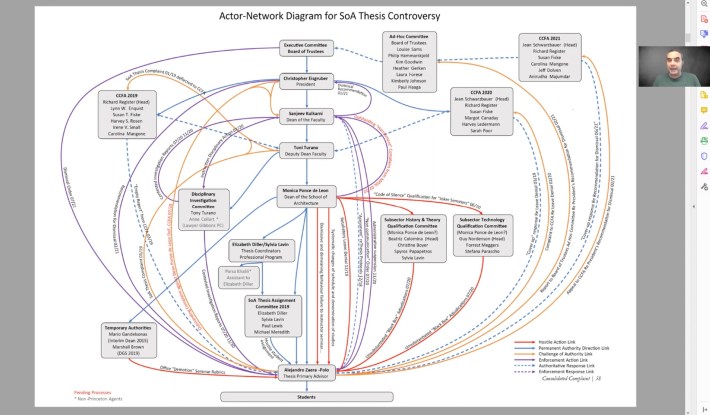Here's a question most public-facing people have thought about at least once in their professional life: If you are fired for doing something stupid, will you quietly move on, perhaps learning from the experience and working to improve yourself, or will you simply become The Joker? One side of the culture war is stocked with people who've tapped an unfortunate seam of pure resentment and found an unfortunately lucrative living mining it. That work is pretty easy to do. Even the most egregious fuckup can be turned into a brave and doomed stand on principle; any well-deserved discipline can be spun as censorship by the woke authoritarian elite. But not everyone has the courage to take the concept to its logical extreme. Not everyone is like Alejandro Zaera-Polo.
The proper nouns in this story are interesting, though not necessarily critical to an understanding of the broader dynamic of all this, but here they are anyway: Zaera-Polo, a faculty member and controversially appointed former dean of the Princeton School of Architecture who is a renowned expert in building facades, was recently dismissed by the school following a protracted fight over a 2014 incident in which he kinda-sorta plagiarized literally Wikipedia for his contribution to that year's Venice Biennale. As Choire Sicha writes for Curbed, the case isn't that simple, and even the Biennale's organizers took AZP's side when he claimed that "I did incur inadvertently in a few instances of paraphrasis." His slip-up could be interpreted as a procedural error in citation, or as actual plagiarism of actual Wikipedia. Princeton pursued his dismissal. He eventually sued Princeton for defamation after he was removed from the dean's chair, though he stayed on as a faculty member until this summer, when a committee finally, formally voted to give him the boot.
But we are not here to get too bogged down in what Zaera-Polo did or did not do vis-a-vis Wikipedia, which is honestly not very interesting. We are interested in how he chose to defend himself. AZP dropped a seven-part, five-and-a-half-hour self-branded "Gonzo Ethnography Of Academic Authority," which is as overstuffed and impenetrable as its name suggests. This was accompanied by a document entitled "The Fascisms of Difference in the Post-truth University," which begins with a lament about being canceled by the woke mob alongside Woodrow Wilson and goes on to chalk the process of his firing up to "postmodernist, relativist dilettantism." He really gets into the weeds here, as you can see by whatever the hell this is.

AZP's beef, such that it can be untangled from the chunky bolus of text and video he disgorged here, is that he was canceled by his elite wokelord bosses—in his words, "opaque committees that cover up and exonerate each other with the ultimate aim of protecting the authorities, at the expense of truth, the rules, and academic freedom." It is at this point that you should remind yourself that the issue in question is whether or not he lifted some lines from Wikipedia.
That point gets obfuscated early and often, and in the course of his meandering defense, AZP reveals himself to be an absolutely world-class asshole of a coworker and teacher. He complains bitterly about the location of his office, posts excerpts of extremely rude emails he wrote to his colleagues, and even reveals that he is banned from "communicating in any manner" with current dean Mónica Ponce de León, who wrote, “Your insults and threats make it impossible for me to do my job” and “I have already asked you to stop your aggression and your inappropriate behavior.” In attempting to defend himself, AZP both shows and tells that he's a rude dick.
Which, again, does not necessarily set him apart from many other tenured academic types. What is more notable here is that AZP is running the standard grievance playbook, but dressing it up with all manner of high-minded academese and leaning on the work of thinkers like Nietzsche, Deleuze, Latour, and Arendt to make his utterly off-the-rack anti-woke/PC mob case. You do not need to hear this dingdong opine about the transition from the Classical era to the Baroque era; in fact, it will probably give you a more confused understanding of the case. If the throughline of this argument—it is worryingly illiberal and perhaps indeed illegal for me to be held accountable for my behavior by others—weren't so familiar by now, it might be impossible to follow. But the thread of it is still visible under all the intellectual and academic jargon he's used to dress it up.
This is what's valuable about it. AZP shows how modular this shit is. What he's saying isn't all that complex or novel, to say the very least. He's just found the most exhausting framework possible to make his case, and in doing so, has advanced the Lament Of The Canceled Man to new heights. My friend who runs in similar architecture academia circles compared it to the legendary "PIPI in your pampers" rant for its overstuffed stupidity, which is about right.
If there's one thing to take away here, it's that "The processes exemplify the implications of the post-truth culture and the imposition of a relativist ideology which leads to the prevalence of political interests over genuine academic concerns, interpretation over evidence, and the abuse of identity politics and political correctness within the contemporary academia" is a much more confusing way to say "I should be the king."
H/t Ian M.






